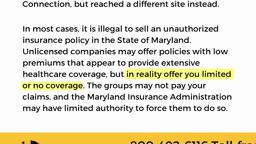WOODLAWN, Md. — A Maryland man thought he was saving money on health insurance, but instead found himself stuck with a $7,000 hospital bill after discovering his policy wasn't accepted by the hospital.
As people search for affordable health care options, scammers are promising comprehensive insurance for a fraction of the price.
Watch today's Matter for Mallory
"Since people have to have it, they want to get the best deal and frequently, there will be incentives, cash drawings, things like that, to entice people to sign up for the product," said FBI Baltimore Supervisory Special Agent Keith Custer.
But these plans aren't covering the bills — they're costing patients, sometimes thousands of dollars in upfront payments.
"The bad guys will take as much as they can get, so they'll go for the annual payment first. And we've seen victims paying upwards of $20,000 or $30,000 up front for a full year's of coverage," said Custer.
The Maryland Insurance Administration warns there's a difference in discount plans and health insurance. You can sometimes get discounted health care services in exchange for a membership fee. However, unlicensed companies selling unauthorized insurance policies offer limited to no coverage, may not pay your claims, and the state can't force them to do so.
The FBI investigated one of these companies after receiving over 100 complaints. Victims were forced to pay out of pocket in full for medical costs and didn't receive refunds.
"A Maryland individual was identified who paid, I believe, $5,000 up front. Later, when he had to go to the hospital for an accident and required surgery, he was on the hook for a $7,000 hospital bill, and he again, quickly found that the money that he had paid had gone to waste," said Custer.
Custer warns that these telemarketers are sometimes insurance brokers — they know the lingo and what to say to deceive and defraud.
Medical insurance scams typically begin with an unsolicited call, text, or email from an unknown business offering a special deal or discount. It's important to do your research, be skeptical if they're asking for a large upfront payment, and check that they're licensed to operate in the state.
The Maryland Insurance Administration has an online database where you can check if the business is licensed. You can also give them a call at 1-800-492-6116, ext. 2217. And they've have tips for consumers where shopping for insurance.
The FBI provided additional information on avoiding these kinds of scams. They include:
- Always make sure the medical plan offered is from a reputable source, and that the company is licensed to operate in your state. The state insurance commissioner or the Better Business Bureau are good sources to verify the veracity of a plan.
- Verify with current providers that they accept the insurance plan you are considering.
- If no policy documents are sent, this could be a sign of a fraudulent plan. If policy documents are sent, review them and read the fine print. Understand exactly what is being offered before committing to anything.
- Don't pay anything upfront. Be cautious if a company asks for large upfront payments or seems to be pressuring you into making quick decisions.
- Report It. If you believe you have been a victim of as similar fraudulent activity, please file a report with the FBI's Internet Crimes Complaint Center at www.ic3.gov. Be sure to include as much information as possible, such as identifying information about the company and or healthcare provider who sold the fraudulent medical insurance to you including name, phone number, address, email address, and website.
- If you have questions about Medicare reach out to them at www.Medicare.gov or call at 1-800-MEDICARE (1-800-633-4227)
This story was reported by a journalist and has been converted from on-air to this platform with the assistance of AI. Our editorial team verifies all reporting on all platforms for fairness and accuracy.




